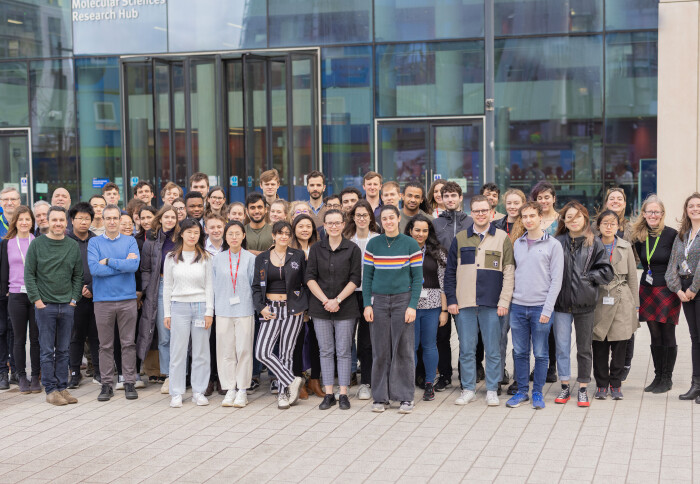EPSRC CDT in Chemical Biology: Empowering UK Biotech Innovation

Breaking News!
We are delighted to confirm the Institute of Chemical Biology CDT has been renewed with £26M cash and in-kind funding to support over 100 PhD students
EPSRC CDT in Chemical Biology: Empowering UK Biotech Innovation
Following the EPSRC’s announcement of the major investment in their research and training portfolio through the launch of their new and renewed Centres for Doctoral Training (CDTs) we are delighted to confirm that the Institute of Chemical Biology CDT has been renewed with £26M cash and in-kind funding to support over 100 PhD studentships.
With over 20 years of experience, the Institute for Chemical Biology has been recognised as a flagship PhD training centre and established Imperial as a world leader in Chemical Biology training and research.
The ICB, including the PI Dr Laura Barter, and co-investigators Professor Oscar Ces, Dr Nick Brooks, Prof Ed Tate, Dr Rudiger Woscholski and Prof Ramon Vilar, have created a new research and training programme that brings together >165 academics, spanning 20 departments and centres at Imperial, and has been crafted in partnership with more than 100 industry representatives from global companies and SMEs, who are foremost in Therapeutics, Agri-science, Personal-care and Bio/med-tech, along with new civic partners from local government, the NHS, VCs, tech accelerators and local developers.
“We are really excited by the unprecedented scale of the CDT, with global as well as UK-wide reach. This has the potential to drive regional economic growth through the CDT’s new civic priority focus that together will support the expansion of the White City Innovation District through knowledge transfer, translation and talent based growth.” Dr Laura Barter (Director and PI).
Chemical Biology is the development and application of novel molecular tools and technologies to tackle challenges within the life sciences, with industrial or clinical benefit. The remit of the new CDT combines this with Lab of the Future platforms such as AI, machine learning and robotics, which together will revolutionise the state of the art with respect to manipulating, measuring and modelling molecular interactions in biological systems and will transform R&D pipelines.
Key to unlocking this future is the training of Chemical Biology PhD and PDRA graduates able to embrace this Lab of the Future concept, and work seamlessly across both the physical-life science but also the human-machine interfaces. This skill-set will enable our graduates to transform understanding of molecular mechanisms of disease, stimulate novel agrochemical design and underpin structured product breakthroughs, whilst also enabling fundamental discovery in the life and medical sciences.
To achieve this, the CDT has a new initiative, the first of its kind, fusing a 1 year MRes and 3 year PhD programme with a 1 year Post-Doctoral ELEVATE fellowship, offering graduates unparalleled in-work experience.
A unique training programme has been crafted where students will gain experience of prototyping & industry 4.0 training in our Biohackspace, a high-throughput Drug Screening programme run in our new automated facility, Science Communication Training run with the BBC at their studios and the InnovaLAB, a commercial SME accelerator supported by some of the world’s largest life science VC funds, creating student-led spin outs that will seed the White City Innovation District.
Our graduates will pioneer molecular technologies and have experience of multi-disciplinary research, translation, and early-stage commercialisation, and we look forward to seeing their achievements over the years to come.
Article text (excluding photos or graphics) © Imperial College London.
Photos and graphics subject to third party copyright used with permission or © Imperial College London.
Reporter
Hannah Cameron
Department of Chemistry